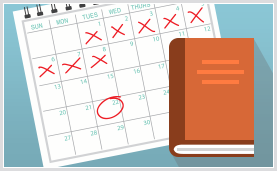
For debut and seasoned authors alike, the time just before your book’s publication can be simultaneously exciting and nerve-racking. To help with the latter, we asked a few Penguin Random House authors and editors to offer their best advice for authors nearing their publication date.
Keep Your Cool
“Don’t panic! There’s only a certain amount you can control. Figure that out and don’t stress about the rest.” (Author)
Be Active Online
“As an ongoing strategy, keep adding Facebook friends, following people on Twitter, etc. You don’t have to be on every platform, but to refuse to interact online at all is to be in denial about the reality of today’s book market. It’s a hard reality for some people, particularly writers, who tend to be less social than others—and especially writers over a certain age, who still consider their privacy sacred. I remind them that the over-fifty-five crowd is driving Facebook growth, and they should consider the average age of their market when selecting their favorite platforms.” (Author)
“These days, it’s all about being found online. I chose my pen name because it was the only one [of that name] on the internet.” (Author)
“A writer today is expected to do quite a bit of self-promotion. Do as much as you are comfortable with. I decided to make a trailer for my latest book, but that was also huge creative fun.” (Author)
Learn from Others
“See what titles are currently succeeding or failing in the marketplace, then try and work backward to see what those authors and publishers have done to promote or market the book. Identifying the right (and wrong!) strategies can provide inspiration for your own outreach online.” (Editor)
Go Local
“Send postcards announcing the publication date. Target independent bookstores, local libraries, book clubs you know about, as well as your poor (literal, figurative, imaginary) friends. People love the buzz that comes with being freshly published, and want to share in your success. Let them.” (Author)
Get Creative
“Take stock of anything you might have accidentally created on your road to finishing your book. Playlists, character sketches, maps, or even any new habits or skills you picked up (maybe you perfected your pie technique when writer’s block hit)—these can all be fun and personal ways to let readers peek behind the curtain. Whether you write a quick essay on how you finally mastered the lattice crust or tweet out your go-to Spotify playlist, sharing is a great way to reflect on your process while letting readers feel more connected to the work.” (Editor)
Back to the Beginning
“Remind yourself why you wrote the book in the first place, and do your best to infuse your interviews and publicity for the book with that commitment and sense of purpose you felt when you first started writing it.” (Editor)
Prepare Yourself for the Best—and the Worst
“Some critics and bloggers may love your book; others may say some very nasty things about it. Anticipate these highs and lows, and try to moderate the roller-coaster effect. Don’t clear your calendar for the days and weeks following publication. There’s no point in sitting around waiting for the reviews to trickle in. Remain available for publicity and marketing needs, but be sure to plan activities that will distract you and keep you stimulated on other fronts. Surround yourself with loved ones and friends whose estimation of you does not depend on your book hitting the bestseller list or racking up rapturous praise. You accomplished something very few people have—you published a book—and regardless of the reception it receives, you will continue to do what you love: you will write.” (Editor)
“I once heard a great piece of advice from a visual artist who insisted on going into the gallery alone before a show. She would look at her art and try to be objective about what was strong and what was not. Then, no matter what critics said, she would know how she really felt about her own work and so nothing they said would make her doubt herself. I think that if authors can really enter into publication with a strong sense of what they have achieved with their books, the reviews (positive or negative) will be easier to hear.” (Editor)
Keep Up the Momentum
“Start writing the next book. If you can get yourself really involved in a new project it helps in two ways: it lets you focus on something productive rather than obsessively checking your Amazon ranking and reader comments, and then it also keeps the reviews from stalling you out on the next book. Too often a critic’s words can get stuck in an author’s head and that can make starting a new project difficult. But if you’re already a hundred pages in, it’s easier to follow the momentum and keep writing.” (Editor)
Network, Network, Network (with Other Authors!)
“Reaching out and striking up conversations with other authors is helpful for many reasons. The author network supports one another by offering positive blurbs, exchanging blog posts, and generally boosting the signal of any promotional efforts made by both author and publisher.” (Editor)
Next Time
Next time we’ll explore the question: What writing techniques have you found most important or memorable? Email us your answers for inclusion.
Andrea Bachofen is part of the Digital Publishing Development group.

